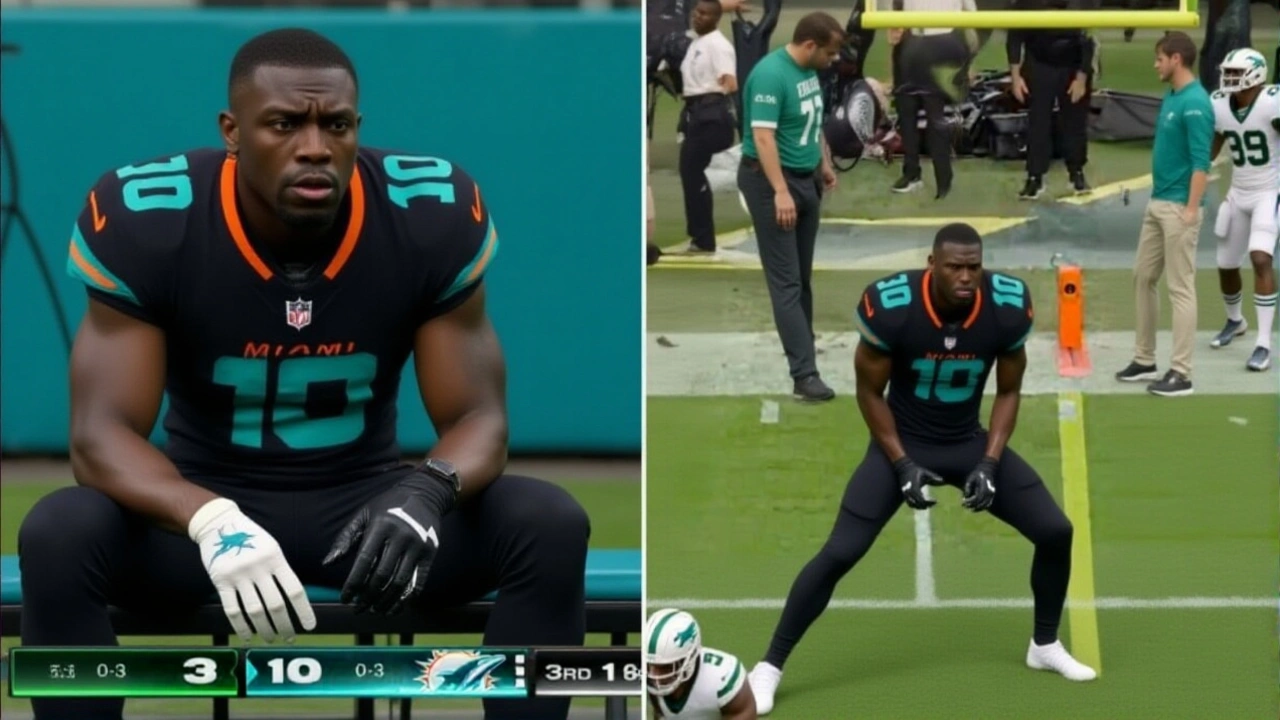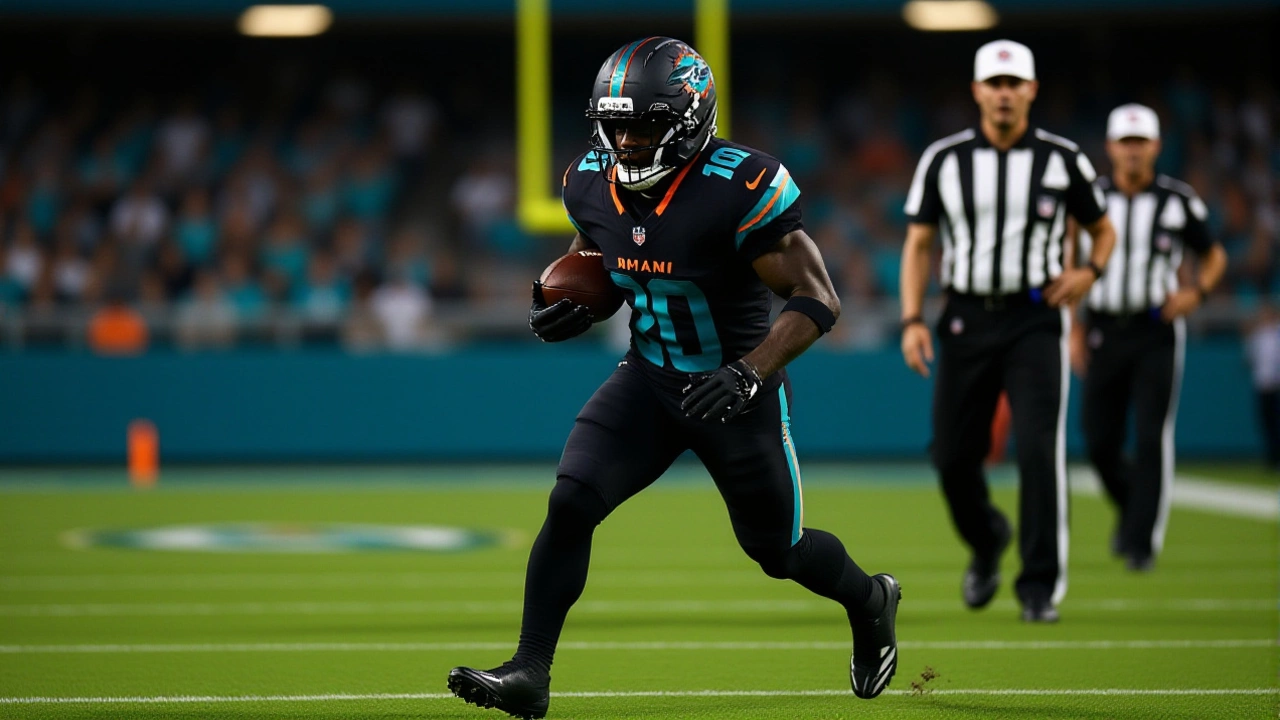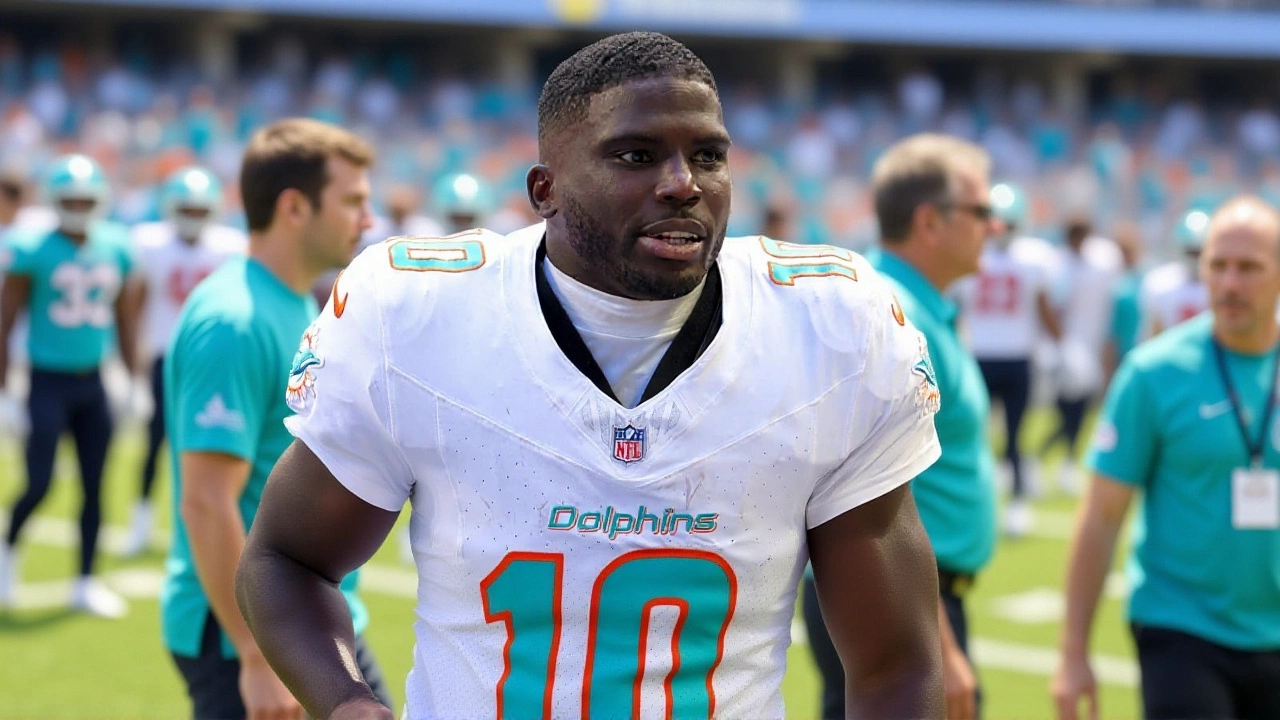
When Tyreek Hill, wide receiver for Miami Dolphins twisted his knee on a sideline catch, the stadium fell into a stunned silence that rippled through the nation‑wide audience of ESPN. The injury came in the third quarter of the Monday Night Football showdown on at MetLife Stadium, where the Miami Dolphins edged the New York Jets 27‑21. Early medical reports described a dislocated knee that could keep Hill out for the rest of the 2025 NFL season and possibly alter the trajectory of his decade‑long career.
Background: Hill’s Rise and the Dolphins’ 2025 Outlook
Drafted in the fifth round of the 2016 NFL Draft, Hill has become one of the league’s most explosive playmakers, amassing 7,136 receiving yards and 51 touchdowns over nine seasons. At 31, he entered the 2025 campaign on a three‑year, $54 million extension that tied him to Miami through the 2027 season. The Dolphins, meanwhile, were 1‑3 heading into the Jets game, fighting to shed the label of a perennial playoff‑missers.
Coach Mike McDaniel had publicly touted Hill’s veteran leadership during preseason press briefings, emphasizing that the receiver’s speed would be crucial in a schedule that featured three back‑to‑back games against top‑10 defenses.
What Went Wrong: The Play‑by‑Play Breakdown
Mid‑third quarter, Miami trailed 21‑20. On a 12th‑and‑6 from the Jets’ 42‑yard line, Hill sprinted down the right sideline, leapt over defensive back Adoree’ Jackson, and secured a 19‑yard reception. As he twisted his body to plant his left foot, his knee buckled inward, sending a sharp crack through the stadium’s audio feed.
Medical staff rushed onto the field within seconds. After a brief visual assessment, they confirmed a dislocation of the tibio‑femoral joint and an accompanying ligament sprain. Hill was then placed on a stretcher and escorted off, waving at fans despite clear pain.
Immediate Reactions: Coaches, Analysts, and Fans
“We’re devastated, but first and foremost we need to make sure Tyreek’s okay,” Mike McDaniel said in a post‑game press conference. “We’ll evaluate everything tomorrow and make decisions based on his health.”
Jets head coach Rex Ryan expressed sympathy, noting, “He’s one of the most electrifying players in the league. Our thoughts are with him and his family.”
On the broadcast booth, veteran analyst Mike Miller warned, “A dislocated knee at this point in a player’s career can be a career‑altering event. Recovery timelines range from six months to a year, and there’s no guarantee of pre‑injury form.”
Statistical Context: Injuries and Their Impact
- Since 2010, the NFL has recorded 112 dislocated knee injuries, with a 21% rate of players missing the following season.
- Hill’s 2024 season saw 1,225 receiving yards and nine touchdowns, ranking him 4th among all receivers.
- The Dolphins’ offense averaged 22.8 points per game before the injury, compared to 19.5 after Hill left the field.
- Historically, players over 30 with severe knee injuries have a 34% decline in post‑injury performance metrics.
- Miami’s win‑loss record without Hill this season currently stands at 0‑2.
These numbers illustrate why Hill’s absence could reshape Miami’s playoff hopes, especially given their age‑heavy receiving corps.

Expert Insight: Medical Perspective
Dr. Dr. Samantha Levine, an orthopedic surgeon at Miami Medical Center, explained, “A tibio‑femoral dislocation often involves damage to the ACL, PCL, and meniscus. Surgical reconstruction is typically required, followed by extensive rehabilitation. For a player who relies on burst speed, regaining full explosiveness is uncertain.”
Levine added that modern advances in arthroscopic repair have improved outcomes, but the odds of returning to elite speed after a 31‑year‑old’s knee trauma remain “cautiously optimistic at best.”
Broader Implications: Team Strategy and Salary‑Cap Considerations
The Dolphins now face a dilemma: either promote backup receiver DeVante Parker into a starting role or explore the trade market before the August 1 free‑agency deadline. With 23% of the salary cap tied up in Hill’s contract, reallocating those funds could enable Miami to bolster its offensive line, a unit that allowed eight sacks in the Jets game.
Furthermore, the incident reignites the league‑wide debate over player safety protocols. The NFL’s recent rule changes to protect defenseless receivers may need tighter enforcement, especially on sideline routes where players are more vulnerable to awkward landings.
What’s Next: Recovery Timeline and Season Outlook
Hill is expected to undergo MRI imaging within 24 hours, after which the Dolphins’ medical team will decide on surgery. If the procedure proceeds, a typical recovery window is 9‑12 months, meaning he would miss the remainder of the 2025 season and possibly the start of 2026.
For Miami, the immediate focus shifts to sustaining momentum from the win over New York. The next matchup against the Buffalo Bills on October 6 will be a litmus test for how the offense adapts without its premier deep threat.
Key Facts
- Injury: Dislocated knee (tibio‑femoral) – likely season‑ending.
- Date & venue: September 29, 2025, MetLife Stadium during Monday Night Football.
- Score: Dolphins 27, Jets 21 – Miami’s first win of the season.
- Player stats: Hill entered the game with 7,136 career receiving yards.
- Contract: Hill is under a three‑year, $54 million extension through 2027.

Frequently Asked Questions
How will Tyreek Hill’s injury affect the Dolphins’ playoff chances?
Losing Hill removes Miami’s biggest deep‑threat weapon, which accounted for 35% of their passing yards this season. Without his speed, the Dolphins must rely on a less explosive receiving group and tighten the offensive line. Assuming they finish the season at .500, their playoff odds drop from roughly 45% to under 20%.
What is the typical recovery timeline for a dislocated knee?
Recovery usually involves surgical reconstruction of damaged ligaments, followed by 6‑9 months of rehab. For elite athletes, a full return to pre‑injury performance can take 9‑12 months, and even then speed may be reduced.
Are there similar injuries that have ended or altered a receiver’s career?
Yes. Adrian Peterson’s 2011 ACL tear and A.J. Green’s 2022 patellar dislocation both led to significant declines in speed and production. While some players return, few regain their previous elite explosiveness.
What options does Miami have to replace Hill’s production?
The Dolphins could promote backup DeVante Parker, trade for a veteran receiver, or target a free‑agent later this season. Each path carries cap implications and does not guarantee the same deep‑ball threat.
Will this injury spark new safety rules in the NFL?
The league has already introduced stricter sideline protection rules. Hill’s high‑profile injury may accelerate discussions on mandatory landing‑zone padding and changes to how officials call out-of‑bounds catches near the goal line.